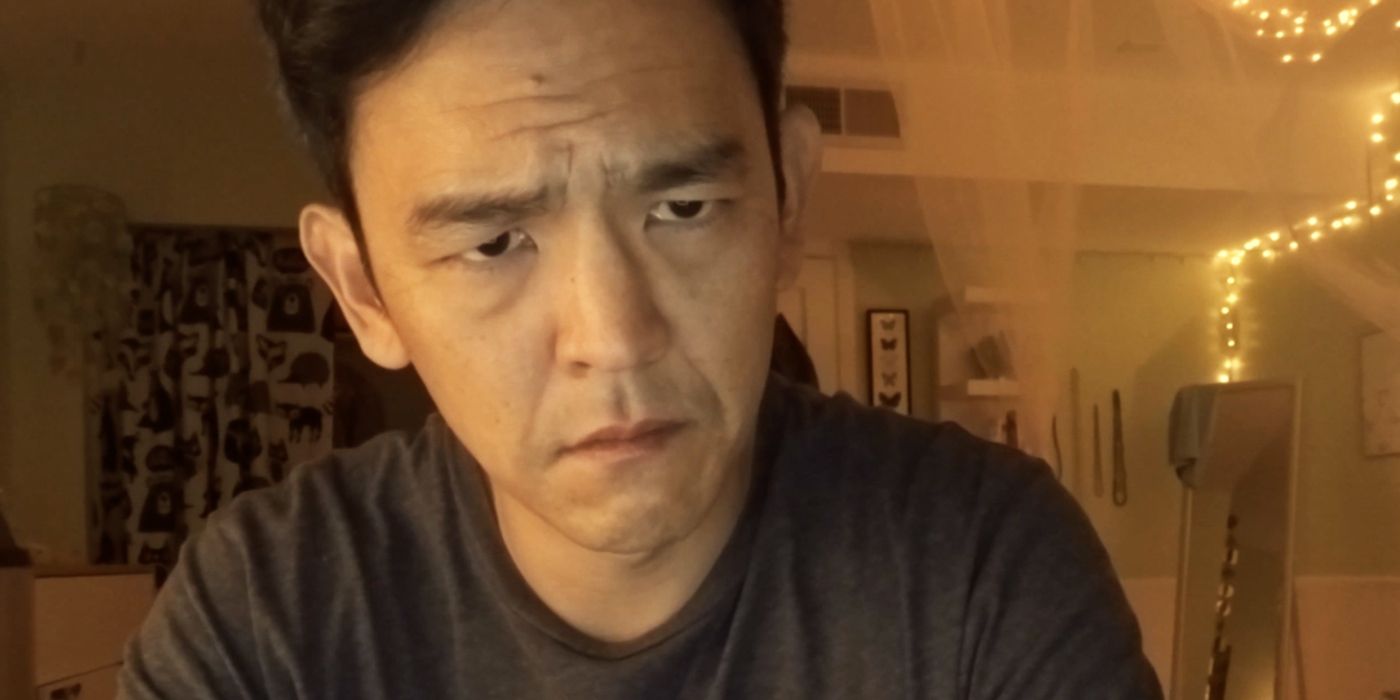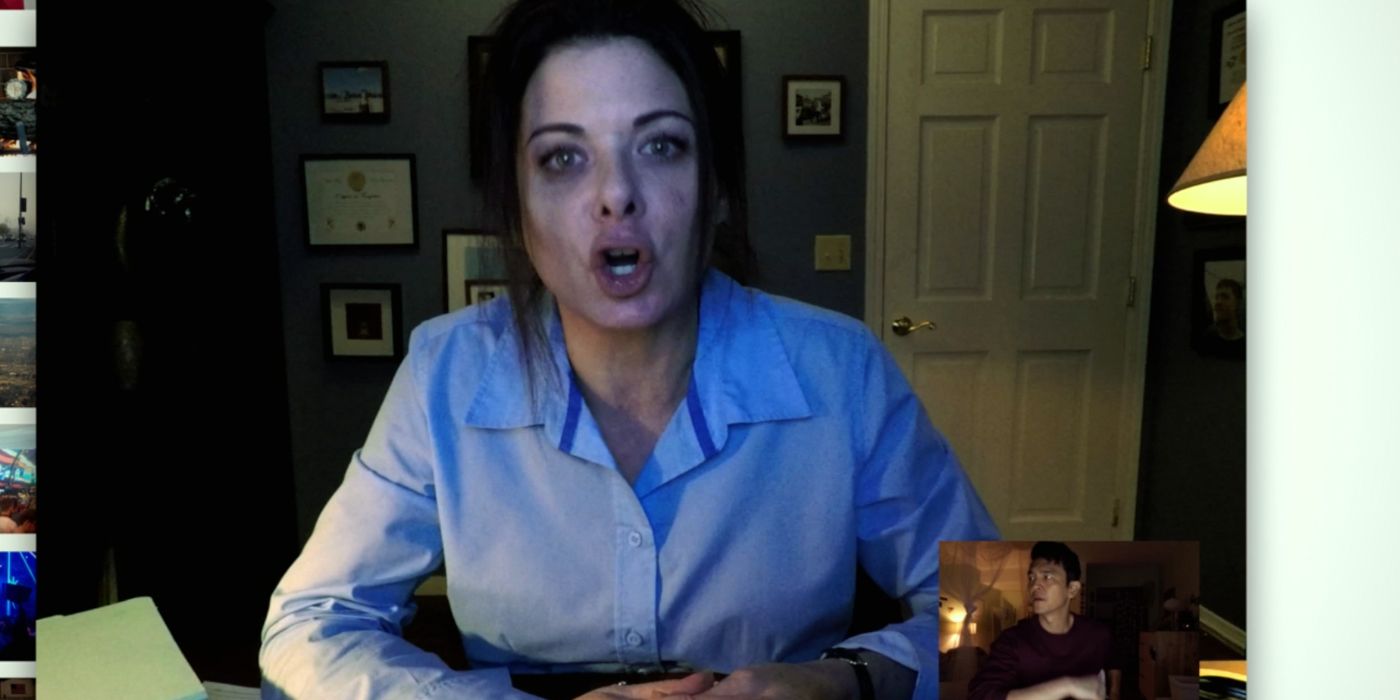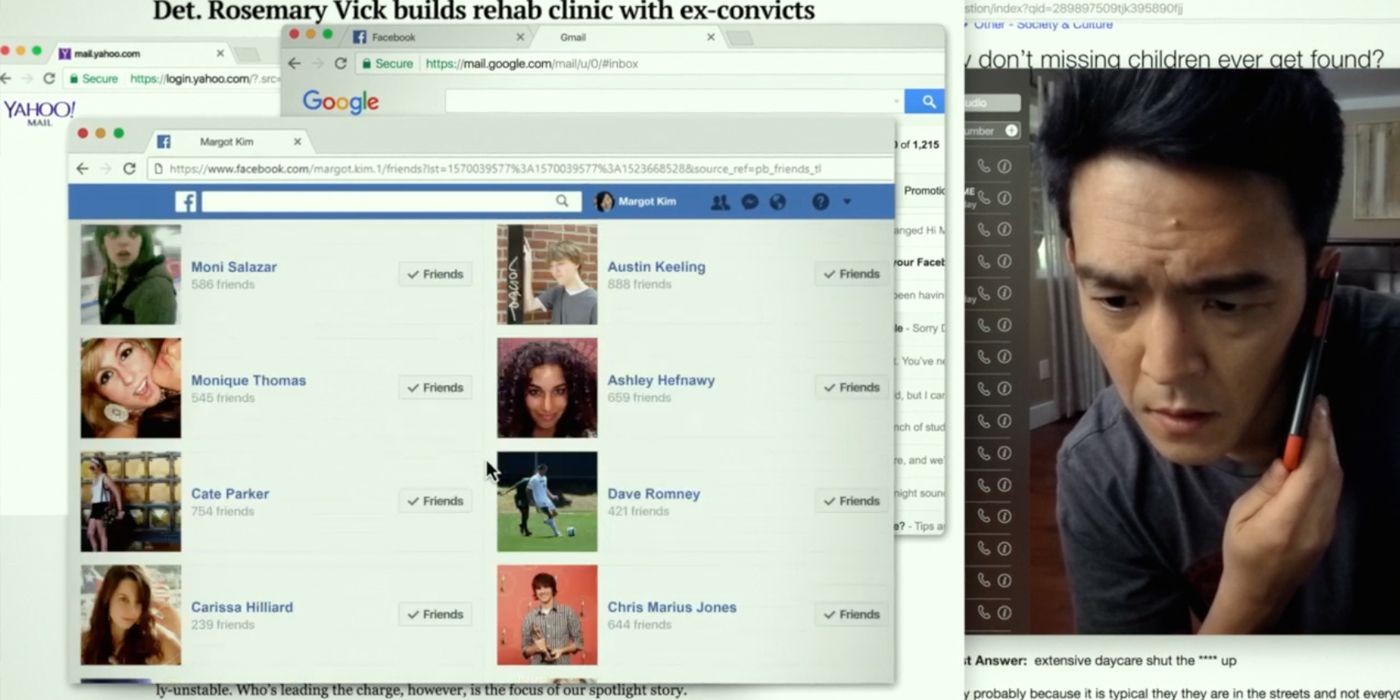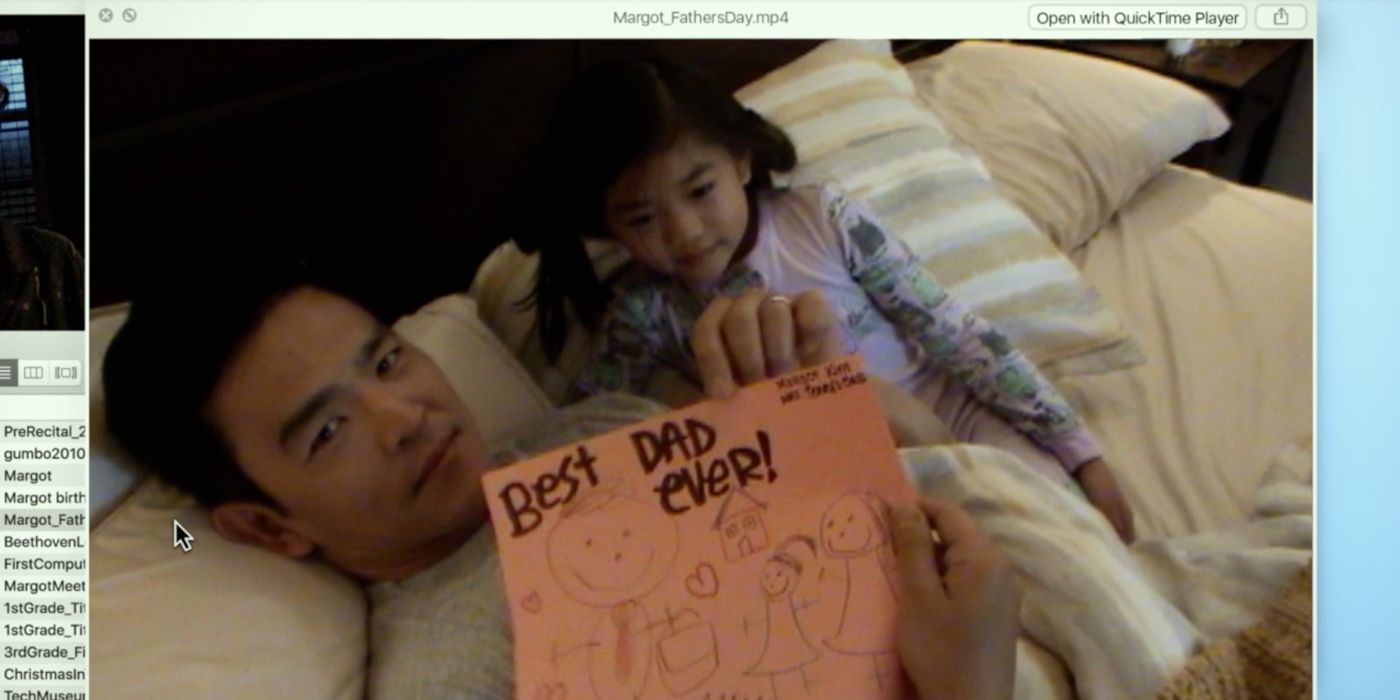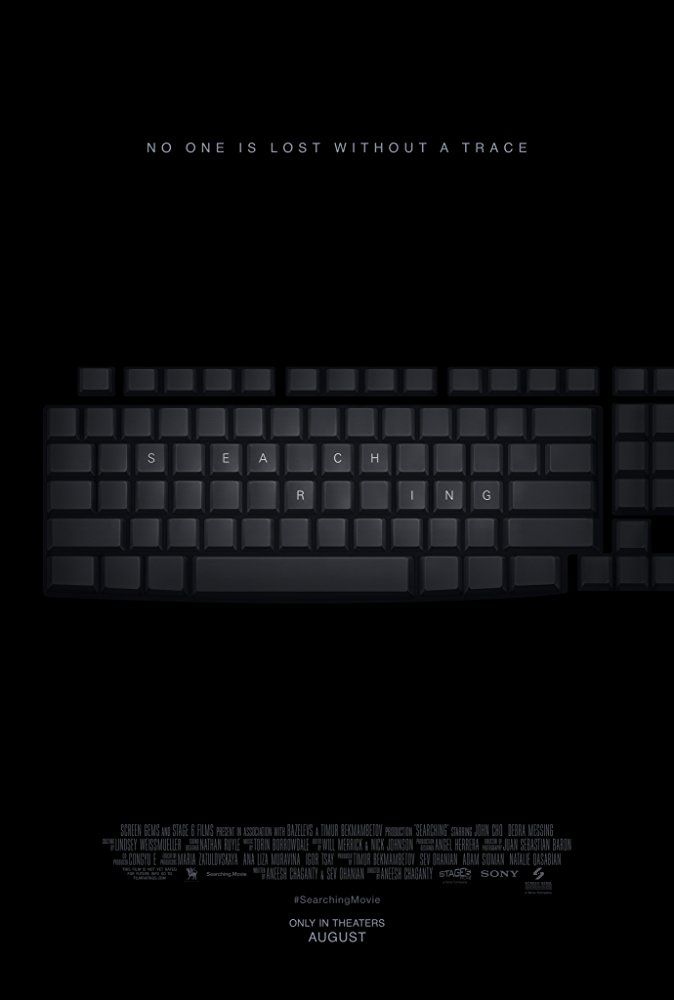WARNING: Major spoilers for Searching ahead.
It's always in the last place you look? Not for Searching, whose twist ending and killer reveal is carefully seeded throughout the movie, tied into the presentation of the narrative and the bigger themes. Searching is the latest Screen Life movie, a relatively new technology from producer Timur Bekmambetov that replicates the look of a computer on the big screen. Previous examples have been mostly horror focused - think Unfriended - but Aneesh Chaganty uses it to make a missing person's thriller.
Searching follows David Kim (John Cho), a widower straining to keep in contact with his daughter, Margot (Michelle La). Following a run of strange behavior, she disappears one night after some frantic phone calls. A police investigation, led by Detective Rosemary Vick (Debra Messing) begins, with David trying to help where he can. He's tasked with getting a list of Margot's friends, something he's willfully unqualified to do, so he turns to technology - hacking her Facebook and tracking down anybody who may know something about her whereabouts. A picture of a social outcast emerges, with Margot spending much of her time stream vlogging and talking to a far-off friend. Eventually, David begins to suspect his brother, Peter, is the killer, but that's a drug-dealing red herring to the upsetting truth.
Watch: Searching Trailer
There are multiple big rug-pulls in Searching that each twist the story in its own way. Here's what happens and what it really means.
- This Page: Searching's Twists Explained
- Page 2: What Searching's Ending Really Means
Searching's Real Killer Was Vick's Son, She Was Protecting Him
Searching seems to come to a grinding halt much earlier than expected with the reveal that the killer was... a random crazed guy. He revealed the "truth" in a streamed confession video-turned-suicide that seemed to elegantly wrap up the entire investigation before Margot's funeral: the killer isn't just caught, he's dead. To an audience, this is far too neat an ending for a movie, and David isn't convinced either.
His first red flag is when he discovers that Margot's red-headed friend from her vlogging is a fake - someone's using a stock photo to hide their true identity - despite her having allegedly been contacted by the police. Then, something more unsettling: he recognizes the "killer" in a photo with Vick as part of one of her police outreach programs.
The truth is that Vick's son, who went to school with Margot, was the killer. He began to stalk her online, crafting a fake identity over months. One night he followed and startled her, accidentally pushing her down a ravine. He called his mother in panic, who conspired to cover up the killing to protect her son. Vick volunteered to take the case on (but later lied to David that it was assigned), and aimed to obfuscate any slither of the truth. Obviously, in a panic to bring what had become a media circus to a close, she chose a supposed killer who was a little too connected to her.
For observant audiences, there were several clues that something was amiss with Vick. She was the main delivery of info on the case, typically shooting down angles that David and viewers knew were important (and claiming an area of wood had been inspected when there was no way for it to be). Her first extended conversation was all about how far a parent would go for a child, telling of another time she protected her miscreant son after he lied about collecting money for charity. And, most damning, when David finds Margot's car, on the other end of the video chat her - and her son - are clearly panicked.
Margot Is Alive
But that's not the end of Searching's surprises. Because her priority was protecting her son and the fall was steep, Vick never checked that Margot was actually dead, assuming that after nearly a week she'd be done for. However, David rationalizes that, due to the storm on the second night of her disappearance, it's possible his daughter's been able to survive by drinking rainwater. And he's right! In the film's finale, the arrest of Vick beelines directly into a successful rescue attempt on Margot. It's a bit of a contrived step, but gives the Kims a much-needed happy ending.
The film comes to an end a year later with Margot going off to college and her relationship with her father evidently improved. David is now able to communicate with his daughter properly, providing love and support while also allowing her to be her own person. The movie's final moment is him finally able to talk about his wife, saying that she'd be proud of Margot.
Page 2: What Searching's Ending Really Means
Searching Looks At How Relationships Warp Through Technology (Obviously)
Fitting of its medium of delivery, Searching takes a close look at how our relationships have changed with the rise of technology. There's the morality of accessing another person's data, the question of how to handle a deceased family member's accounts, and a judgment-lacking view of Generation Z's childhood shaped by computers.
At the center of the narrative is how it skews our view of the real world. Margot is, of course, catfished, with Vick's son (somewhat accidentally) misleading her about his identity and intentions, leading to near-fatal consequences when it spills over into the real world. Catfishing has become colloquially known thanks to the documentary and subsequent MTV series, but its impact can often be lost. In a more mundane but far-reaching sense, though, the distorting powers of instant communication and social media are highlighted. Margot's Facebook wall in like anybody else's on the surface, yet digging into her friends list reveals nothing but acquaintances and childhood overhangs.
What Searching really balances is how technology enlightens and obscures. Without his access to computers, David wouldn't be able to construct a detailed image of Margot's life and the night of her disappearance; he essentially does what the police should have, had Vick not sabotaged. But it also leads to repeated miscommunication; he suspects his brother of murdering Margot based on vague text messages, and the blanket coverage of the disappearances means he's suspected of doing it almost immediately.
Searching Is Really About Parenting
And yet, despite all that, with its main character and villain twist, at the core of Searching are age-old questions about parenting style. David struggles as a single father, trying to nurture his teenager daughter yet unable to fully communicate his feelings. Vick, meanwhile, is so overly protective of her son that she'll enable him to do despicable things then cover-up when the problems come. These are both exacerbated by technology, adding an extra barrier for David and more complications for Vick, but the differing styles act independently.
The grieving widower aspect cannot be understated. Searching opens with an Up-style montage of Margot's childhood relationship with the family computer that transitions into an account of her mother's battle with cancer, framing David's and her actions with loss. The strain on both David and Margot is felt from the start, and when she vanishes the pain of the past becomes slowly unbearable.
Searching is unequivocally damning of Vick's style, making a clear point that what's important - in all relationships - is communication, whether that be over a screen or face-to-face.

